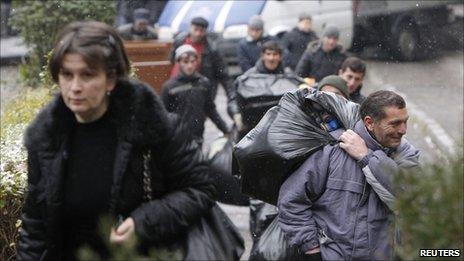Anger as Georgia evicts refugee families from capital
- Published

Twenty builings are being evacuated
Georgian police have resumed evicting refugee families living illegally in the capital Tbilisi as a result of conflicts in the ex-Soviet republic.
Scuffles broke out as police moved out the first of 550 families, destined for resettlement in the provinces.
Refugees could be seen streaming out with belongings in plastic bin bags.
Human rights activists have condemned the evictions, saying the families are being moved to rural areas with no employment or facilities.
Their protests halted evictions during the summer, when 5,000 people were resettled.
Police aim to clear about 20 buildings where the remaining families live.
The country has been torn apart by wars since the collapse of the USSR, notably the conflicts in its breakaway provinces of Abkhazia and South Ossetia.
Compensation 'appropriate'
Valery Kopaleishvili, a spokesman for the ministry responsible for refugees, defended the evictions.
"An absolute majority of these IDPs [internally displaced people] have already received appropriate compensation from the government - either houses in the regions or financial compensation to build houses," he told AFP news agency.
There are thought to be about a quarter of a million IDPs in the country, with nearly 100,000 of them in Tbilisi.
According to AFP, tens of thousands of refugees still live in buildings such as kindergartens and student dormitories where they were rehoused temporarily.
Malkhaz Kordzaia, who was forced to flee Abkhazia, told Reuters news agency the government was set on "destroying and humiliating Georgian people".
Lasha Chkhartishvili, a leader of the opposition Conservative Party who has been organising protests for refugees' rights, said the refugees were "doomed to starvation" in the countryside.